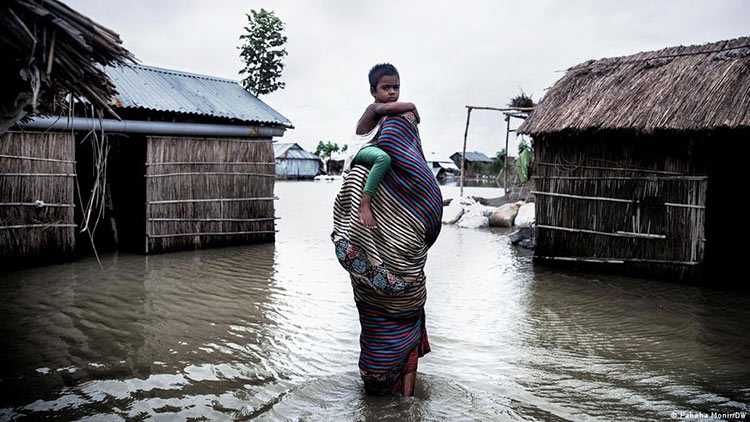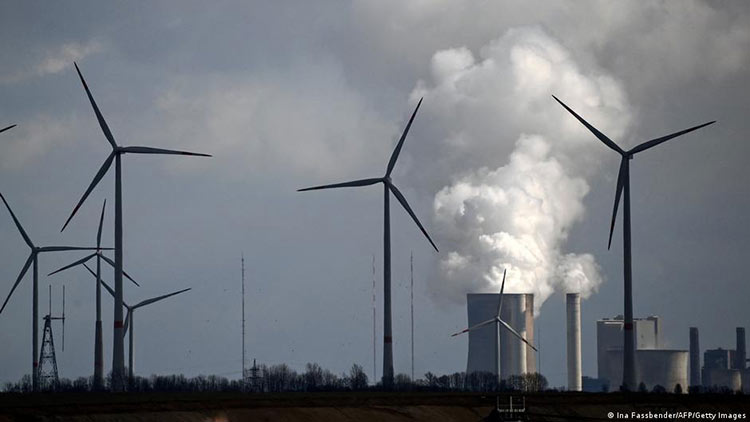The United States and several other nations have pledged to cut carbon emissions faster, putting pressure on other big polluters to clean up their acts.
US President Joe Biden has promised to halve his country’s greenhouse gas emissions by 2030 from 2005 levels, kicking off a global climate summit to pressure other polluters to bring their emissions in line with international agreements.
“The cost of inaction keeps mounting. The United States isn’t waiting,” he said on Thursday in the opening address of the two-day summit being hosted virtually by the White House.
Biden called on the world’s largest economies to join the US and step up the fight against climate change. “No nation can solve this crisis on its own, and this summit is a step on a path to a secure, prosperous, and sustainable future,” he said.
Several countries also upped their pledges on Thursday.
Japan announced plans to cut emissions 46% below 2013 levels by 2030. Canada said it would aim to slash emissions 40%-45% by 2030 below 2005 levels. China’s President Xi Jinping reiterated his country’s goal to peak CO2 output before 2030 and achieve carbon neutrality by 2060, adding that coal use would gradually decrease in the second half of this decade.
German Chancellor Angela Merkel highlighted the herculean task ahead for the world, calling the fight against climate change “nothing short of a complete transformation in how we do business.” European Commission President Ursula von der Leyen added that “carbon must have its price, because nature can’t pay the price any longer.”
United Nations Secretary-General Antonio Guterres said the next decade must be one of transformation, and other world leaders echoed the message.
Brazil’s Jair Bolsonaro pledged to go climate neutral by 2050, bringing his country’s goal forward by 10 years, and end illegal deforestation, which has spiked under his leadership, by 2030. Several leaders of countries already struggling with the effects of climate change stressed the need for rich countries to deliver their unmet promises to help poor countries adapt.
“You need to accept that the era of fossil fuels is over,” said Xiye Bastida, a youth climate activist from Mexico, addressing the leaders. “We demand that you stop systematically targeting the Global South — and Black, Brown and Indigenous communities — through environmental plunder.”
Ambitious climate targets are ‘very encouraging’
The US has dirtied the atmosphere with carbon dioxide more than any other economy and its citizens have some of the highest carbon footprints in the world today. Though the 50% target announced on Thursday is not binding, it raises the US commitment to cutting emissions by about a third and could spur other governments to stop burning fossil fuels sooner.
World leaders in 2015 promised to limit global warming to well below 2 degrees Celsius (3.6 degrees Fahrenheit) above pre-industrial temperatures in a bid to hold off the worst effects of climate change. But as recently as November, a United Nations report found their official plans to achieve this were “woefully inadequate.“
While more ambitious climate targets are “very encouraging indeed,” said Prakash Kashwan, a professor of political science who researches climate justice at the University of Connecticut, big emitters like the US and EU should explicitly recognize the carbon debt they owe the rest of the world instead of using their domestic actions to cajole other countries. “Lead from the front by delivering actual emission reductions.”
Climate ambition
The 40 world leaders meeting virtually for Biden’s two-day summit are responsible for 80% of the yearly greenhouse gas emissions that are heating the planet and wreaking havoc in the form of worse droughts, cyclones, floods, heatwaves and wildfires.
As well as the big polluters, leaders from some of the countries least responsible but most vulnerable to climatic shifts are also attending, like the Democratic Republic of Congo, Jamaica and Bangladesh.

Some countries announced steeper cuts in the run-up to the meeting, which is seen as a critical milestone on the road to the COP26 UN climate summit in Glasgow, UK, in November.
On Tuesday, the UK set the world’s most ambitious target with a law binding the country to cut greenhouse gas emissions 78% by 2035 from 1990 levels. The goal includes emissions from ships and flights abroad that have traditionally been ignored by domestic governments. Later that evening, EU lawmakers reached a legally binding deal to make the bloc’s climate goal — to cut net greenhouse gas emissions 55% by 2030 from 1990 levels. The target is less ambitious than the 60% that the European Parliament had previously voted for.
Climate diplomacy
US climate envoy John Kerry met his Chinese counterpart Xie Zhenhua in Shanghai last week as part of a renewed push in US climate diplomacy. But while they agreed to discuss concrete actions this decade to cut carbon pollution, they did not announce more ambitious pledges.
“For low- middle-income countries, we need to see both China and the US are committing,” said Marcelo Mena-Carrasco, director of the Climate Action Center at Pontificia Universidad Catolica de Valparaiso and a former Chilean environment minister. “That’s a way to see the global burden of emissions is taken care of.”

A similar trip to India also failed to yield stronger commitments. During the meeting, the Indian Foreign Ministry stressed the need for rich countries to fulfill their unmet pledge to send $100 billion (€120 billion) a year in climate finance to poorer ones by 2020.
As part of an executive order in his first days in office, Biden announced a new climate plan — expected to be released during the summit — on how the United States will work with the World Bank and International Monetary Fund to help poorer countries cut their emissions and protect ecosystems.
But even delivering on that promise may not be enough to convince poorer countries to give up fossil fuels their economies rely on.
“Climate finance is such a small bucket it doesn’t support transformational changes,” said Jennifer Tollmann, a senior policy advisor at Berlin-based climate think tank E3G.

Broken promises
Biden is also using the summit to portray the US as a global leader in the fight against climate change. Its reputation had suffered under the administration of his predecessor Donald Trump, who in addition to taking the US out of the international Paris Agreement also rolled back environmental laws while promoting coal, oil and gas.
The US “has offered nothing on how it plans to make up for the lost four years,” said Chinese Foreign Ministry Spokesperson Zhao Lijian at a press conference on Friday. “Its return is by no means a glorious comeback but rather the student playing truant getting back to class.”
Chinese Premier Xi Jinping surprised the world in September by announcing that China would peak its carbon dioxide emissions by 2030 and reach net-zero by 2060. But it has since continued to invest in fossil fuel projects, particularly to build coal-fired power plants across Asia.
At the summit, South Korea announced it will stop funding coal plants overseas, a move that Japan and China may follow.
As well as finances and emissions, the summit will also host sessions on jobs, climate security, adaptation and nature-based solutions that include further efforts to stop deforestation.
A report published Tuesday by the Rainforest Foundation Norway found that none of the five countries with the biggest rainforests — Brazil, Democratic Republic of Congo, Indonesia, Peru, and Colombia — have committed in their emissions plans to end deforestation by 2030, despite having agreed to do so.
A common frustration among activists and scientists watching the talks is the lack of short-term action.
“We have been having the same song with other leaders, so we are tired of empty promises,” said Kevin Mtai, a climate activist with student protest group Fridays for Future in Kenya, adding that Biden should immediately stop US-headquartered fossil fuel companies causing environmental problems in the Global South. “We need action not later but right now, because the planet is dying.”
Source: Deutsche Welle